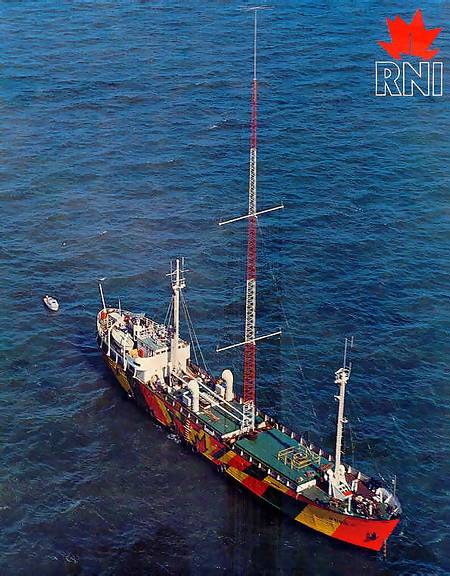SEVENTIES DIARY
23rd January 1970: First test broadcasts for Radio Northsea International (RNI).
28th February 1970: RNI begins regular programmes from anchorage off Holland.
23rd March 1970: RNI's ship, Mebo II, moves to new position off Essex.
13th June 1970: RNI changes name to ‘Caroline International’ as part of election campaign.
14th June 1970: Capital Radio begins intermittent test broadcasts from the mv King David off Holland.
23rd July 1970: RNI, now using original name again, moves back to the Dutch coast.
29th August 1970: Boarding party fails in attempt to take over the Mebo II.
1st September 1970: Capital Radio begins regular programmes of light music with announcements in Dutch and English.
24th September 1970: RNI closes down after being bought off by rival Radio Veronica.
10th November 1970: Mv King David goes aground in a storm. Capital Radio silenced.
21st February 1971: After weeks of anonymous test broadcasts, RNI returns to the air.
15th May 1971: Mebo II fire-bombed by raiders.
29th September 1972: First anonymous tests from mv.Mi Amigo for return of Radio Caroline.
30th September 1972: Veronica changes frequency. Its old wavelength grabbed by ‘RNI 2’.
17th December 1972: Programmes begin from Caroline's Mi Amigo as ‘Radio 199’.
22nd December 1972: Radio 199 changes name to Radio Caroline.
25th March 1973: Caroline closes abruptly, in the middle of a record, when generator fails.
April 1973: Radio Veronica borrows the Mi Amigo after its ship is grounded in a storm.
4th June 1973: Radio Caroline returns to the air with two services, English Top 40 on 389 metres, Dutch MOR by day, rock through the night on 259 metres.
26th June 1973: Generator failure silences the two Carolines.
15th July 1973: Belgian Radio Atlantis begins, hiring the daytime output from the Mi Amigo.
24th July 1973: Radio Seagull begins broadcasting during the evening from the Mi Amigo.
30th December 1973: Radio Atlantis begins programmes from own ship, the Jeanine, Flemish by day, English at night.
1st January 1974: Radio Mi Amigo is now hiring the daytime output from the Caroline ship.
23rd February 1974: Radio Seagull changes name back to Radio Caroline.
30th August 1974: The Mi Amigo sails back to the UK coast.
Radio Northsea's English language service closes down.
31st August 1974: Dutch anti-pirate legislation comes into force.
Radios Veronica, Northsea and Atlantis close down.
8th November 1975: MV Mi Amigo loses her anchor in a gale. Drifts inside territorial limit.
13th November 1975: After bungled towing attempt, Caroline returns to air while inside UK waters.
14th November 1975: Mi Amigo raided by police. Two Caroline DJs, one engineer and ship's Captain arrested.
26th November 1975: Radios Caroline and Mi Amigo return to the air from outside the limit.
21st August 1978: First test transmissions are broadcast for Radio Delmare on 1570 kHz, 191 metres, from the Aegir anchored off Holland.
11th September 1978: The Aegir is abandoned after going adrift in a force 9 gale.
20th October 1978: Radios Caroline and Mi Amigo closed down by generator failure.
19th January 1979: ‘Mayday’ call from the mv Mi Amigo brings out a lifeboat to take off last remaining crew-members as ship takes in water.
15th April 1979: After nearly six months silence, Caroline returns to the air with programmes in Dutch and English.
2nd June 1979: Radio Delmare returns from a new ship, the Martina, on 1566 kHz, 192 metres.
25th June 1979: Test broadcasts commence for a new Radio Mi Amigo, this time from their own ship, the mv.Magdalena, on 1100 kHz, 273 metres.
1st July 1979: Regular programmes begin from the new Radio Mi Amigo.
18th September 1979: Radio Mi Amigo closes down after the ship drifts onto a sandbank.
28th September 1979: Radio Delmare closes down.
(20th March 1980: The mv Mi Amigo sinks after the crew has abandoned ship.)
|


